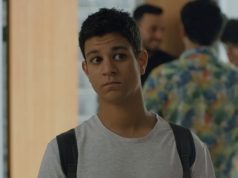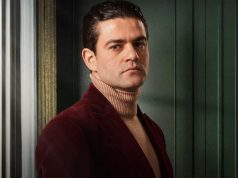By Shorouk Abbas & Francesca Sullivan
It’s late afternoon at a rural film studio outside Cairo and a production team, crew and crowd of extras are waiting for the arrival of Ahmed El Sakka. He’s taking time out from shooting his Ramadan series Zihab wa Awda to star in a commercial for the new Chevrolet Optra.
As Egypt’s best loved action hero, star of bad boy dramas like Tito, Mafia, and El Gezira (The Island), El Sakka is an obvious choice to show case a macho new machine, and as he breezes into his trailer and flops down for a breather before the shoot, there’s no need to ask whether he likes the car he’s promoting. “It’s great; I’ve just bought one,” he declares.
El Sakka has massive box office appeal, and over the course of his career has gone out of his way to try different genres as an actor, from action drama through to romantic comedies. “I don’t have a preference,” he insists. “I’m an actor. If I love a script, then I can become that character. If I believe in myself as that character, the audience does too.”
It was of course the most successful comedy in the history of Arabic cinema, Saeedi at the American University — in which he co-starred with Mohamed Heneidy — that launched his career. Yet the image he most lives up to and appears to identify with, is less comedic and more connected to his first ambition: to join the police force. “I went to the police academy and trained to be in the special command unit. That was my first choice as a career!”
So why the switch to acting? “I’m still trying to figure that out,” he says, with a wry laugh. It’s hard to tell whether he’s serious. Some might say that with a famous director as a father (Salah El Sakka), the jump to acting was predictable, and he has certainly taken the profession seriously, graduating from the Faculty of Cinema in 1993 and working his way through a long list of hit movies and TV series.
Yet much about El Sakka seems to reflect that original ambition. He feels a sense of identity with the forces of law and order, has a testosterone-fuelled tough guy image (riding and shooting are his hobbies), and has a strong penchant for action roles – in fact he’s famous for doing his own stunts, with the injuries to prove it.
“Of course I take all the right safety precautions, but accidents can still happen. I’ve injured my knee, and my neck, and in 2007 sustained serious damage to one eye,” he recounts, almost casually. “But I believe that acting is something that requires you to build up your emotions from the inside, bit by bit, and that means in a physical sense also. That’s why I need to go through the action sequences to complete that character construction.”
El Sakka is so serious about stunt work he hired an international name in the stunt world, Australian stunt choreographer Andrew Mackenzie, to work with him and help build a professional Egyptian stunt team, a project first begun in 2006. One incident which may have contributed to his determination to seek expertise was a notorious shooting fiasco in 2004 in which, he recalls: “There was a shot we needed that involved me jumping off a well-known Cairo bridge into the Nile. Despite having various cameras they weren’t coordinated, so I did the same jump a total of four times because the first three times not one of the cameras caught it!”
Another incident he still vividly recalls happened while shooting Africano with Mona Zaki in 2001. Taking a solitary walk off the set in the South African bush he came face to face with a lioness, and made ‘the fastest jump ever’ over a strategically placed electric perimeter fence inside the game reserve. Interestingly the Africano shoot seems to have left an enduring love for South Africa which he and Mona Zaki share to this day.
movies taken from literature, but that was when our literature was richer. Where is that legacy now?” ponders the star.
“I knew Essam was writing the book,” explains El Sakka, “and [I] persuaded him that it would make a great TV drama. Also that the series would be helpful in promoting the book.” The story is an extremely emotive one, particularly since it involves a child. El Sakka’s son in the series is played by a young debut actor who was chosen from hundreds who auditioned. “I had a say in those auditions because I needed to have a strong rapport with the little boy. Perhaps one reason why I chose Adham, who plays the role, was because he looks very like my youngest son.”
El Sakka is father to two boys and a girl. Have they seen his movies? “Only my older son, aged fourteen, has been allowed to see all of them. Some of them involve adult themes that the younger two couldn’t understand.” One of those is the hugely successful El Gezira , which came out in 2007, and deals with drug wars in Upper Egypt. The sequel, Gezira 2, has only just been made all these years later, and is in cinemas now. But that delay has been to the advantage of the film, thinks El Sakka,“ El Gezira was a movie ahead of its time. When it came out the audience still believed, or pretended to believe, that the themes in it were a fiction in Egypt. Though many films over the past decades have dealt with the subject of mafia and drug gangs, it was still somehow make-believe; something that only happened abroad. Since then we have been through a revolution and the exposure of proven mass corruption at high levels. Good policemen turned out to be bad. Religious leaders were questioned. Many things have changed. Post revolution the audience realizes that it’s real, and it’s given Gezira 2 a credibility that the first film, despite its success, didn’t have.”
Credibility is a quality that El Sakka has earned many times over in the eyes of Egypt’s cinema going public, and Zihab wa Awda seems set to join the long list of hits he’s enjoyed so far.
If you could choose to meet anyone, alive or dead, who would it be?
Leonardo di Caprio, because I admire him very much as an actor. His choice of roles baffles me like that of The Great Gatsby. Otherwise Robert di Nero or French actor Jean Renault for the same reason.
What would be your perfect evening out?
In the desert under a full moon, a couple of chairs… and I don’t want to say more!
What do you consider the most important skill required to do your job?
Perseverance. To always strive to be better. Talent and charisma are seventy percent of acting, but there is always room for improvement.
What do you do when you’re bored?
Go and ride one of my horses, or take my dogs out.
What’s your worst habit?
It used to be losing my temper – but these days I’ve cooled down a lot.
Are you a late night or early morning person?
I like to sleep early and wake up early.
Tea or coffee?
Coffee, especially when I’m under pressure.
What are you reading right now?
A new script that will be my next project. It’s a historical movie set during the Ottoman occupation.
Do you have a favourite song on repeat?
I love to listen to classical music of all kinds, especially the songs of Um Kulsoum and Abdel Halim Hafez.
Where did you go for your last holiday?
Cyprus. It was actually work, as we were shooting there, but my family came out for a holiday.
Who was the last person you dialled on your phone?
You guys – to say I was on my way!
Name five essential items you never travel without?
My electric hand shaver, a small shoulder bag, my passport and my home-sickness.
What’s the best piece of advice you’ve ever received?
Before my father died, he asked me, why do they call you a movie star? When I began to list to him my achievements he interrupted me and said: never become untouchable like a star, never take revenge on anyone, and always forgive what is done to you.
Back to the here and now, Zihab wa Awda, in which he plays the father of a boy abducted by an international criminal gang of organ harvesters, has given El Sakka, he says, a chance to explore greater emotional depths than ever before. And he has relished that opportunity. “My character is just a normal guy. He is unprepared for what happens to him, and not equipped for the journey he has to take.”
In literal terms, that journey involves a trip to Cyprus, and also requires El Sakka to act in English for the first time. For someone who never formally studied the language, was this challenging?
“Acting is acting, and for me body language is crucial. It’s not about thinking in English. The ‘Egyptian method’ of acting for me is about internalizing the character, and letting the character speak, however that comes out – sometimes even forgetting about the script.”
Zihab wa Awda is directed by Ahmed Shafik and written by his personal friend, novelist and first-time scriptwriter Essam Youssef. It is based on a true story–something that appeals to El Sakka. “I always prefer drama based on true life. I feel it’s a more direct route that allows the audience to connect with and believe in the story. In the past we made great





